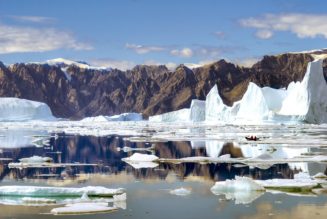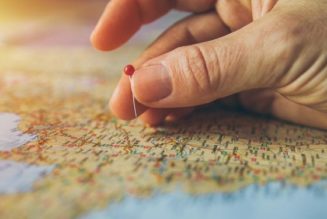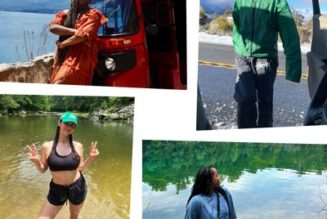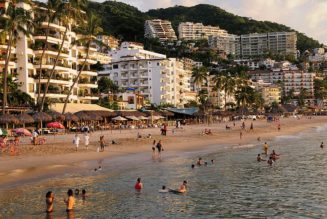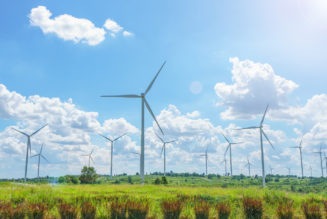On a rainy summer day, I took a train to the Swiss city of Saint-Maurice and trekked through the squelching mud to a medieval fortress perched high atop a cliff. After descending into a dark cavern and twisting through its dimly lit corridors, I finally arrived at the main viewpoint of the Grotte aux Fées (Cave of the Fairies): a plunging 77m waterfall that shoots from an underground limestone ledge into a translucent pool. As the splatter echoed through the cavern and drenched my jacket, I closed my eyes and took out my phone to record the rush of dreamy reality before me.
I had come in search of a sound, not a sight.
Throughout my travels, I’ve found myself collecting sound recordings the way other people collect souvenirs. On my phone, there’s a recording of the soft, muffled footsteps and whispers inside The Art Institute of Chicago; ferry toots from a steamboat at the harbour in Evian, France; merchants and shoppers haggling in rapid-fire Italian at the Fontanella Borghese market in Rome, Italy; the chirping birdsongs and rush of wind whistling through the redwoods in Marin, California; and much more.
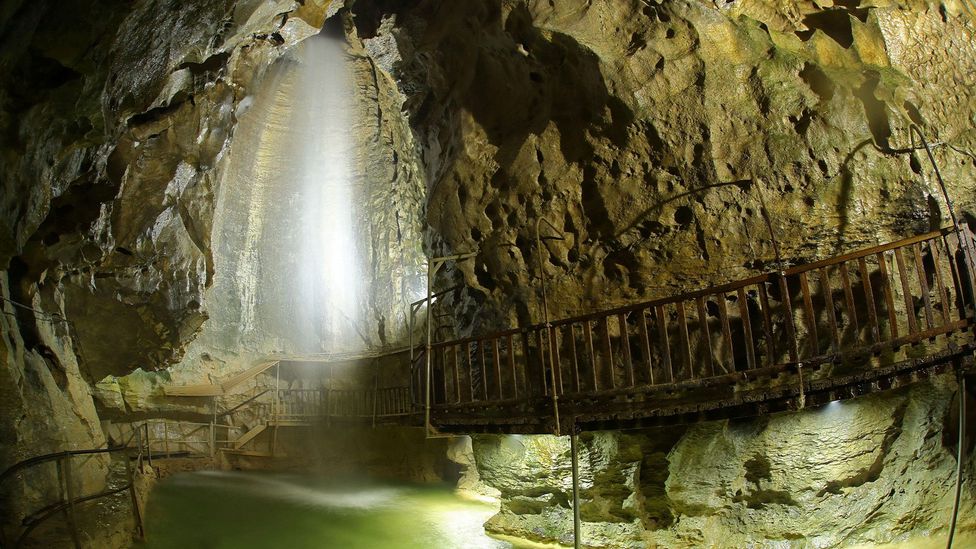
The Grotte aux Fées is a well-known site, but its sound is equally enchanting (Credit: Reuters/Alamy)
Just as some travellers take photos of landscapes or their food, I started doing this as a quirky and artistic way to help me remember some of the most interesting details of my trips. I’ve found that when I listen back to these recordings, I’m able to recall each place and moment in a different way than I can by scrolling through images. It turns out that this may be because our brains remember sound differently than other types of senses.
According to Dr James Giordano, a professor of neurobiology and biochemistry at Georgetown University Medical Center in Washington DC, our brains process information and turn it into memories by receiving it through our senses, encoding it and storing it – much like a computer. When we receive information and encode it, it is fairly short-term in nature; but when we store it, it becomes long-term memory. The information we receive and process with our ears is called echoic memory.
“Think of the brain as a space and time machine. What it allows us to do is to literally transport ourselves back and forward in time, across spaces,” Giordano said. “Echoic memory is exactly as the name would imply: it is, in fact, an echo of something that occurred.” Giordano explained that our brains transform sound into memory in a nearly identical way as we do with other senses, yet it appears we are far better at remembering what we see and touch than what we hear.
According to a study at the University of Iowa aptly named In one ear and out the other, a group of students participated in two experiments in which they listened to sounds, looked at images and held objects. In the first experiment, students were asked to recall whether various stimuli were the same or different after a set period of time. In the second, they were asked to recall the sounds, images and objects after an hour, a day and then a week. In both instances, students’ recollection of sound was far worse than their tactile or visual memories, and the longer the elapsed time, the greater the gap became.

It turns out that our brains remember scenes better than we remember sounds (Credit: Kawee Wateesatogkij/Alamy)
This study seems to suggest that if we take a picture of something during our travels and record the sound of the same thing, the image will appear more familiar to us when we look back at it on our phones, while the sound will seem fresher and, in a way, newer or more striking. Perhaps this explains why my eyes tend to glaze over when I’m scrolling through images I can vividly recall, while my mind awakens more readily to more-distant sounds that transport me back to a place.
Since our sound memories are bad, it’s perhaps more important to record sounds than taking photos, so that we can truly recall the experience. Amy Poremba, the professor who conducted the University of Iowa study, seems to agree. “I went to Hawaii to the Big Island, and there are black volcanic beaches there. Black volcanic rock beaches have a really particular sound. They [make] this kind of tinkling-glass sound when the waves hit them.” Poremba was so struck by the sound that she pulled out her phone and recorded it. After flying back home, she said she “listened to it over and over again”.
Giordano explained that, just as the smell of certain foods may transport us back to an especially memorable meal you might have had during your travels, sounds can have the same poignant effect. “Our experiences of certain scenarios are very often linked to other aspects and dimensions of the experience,” Giordano explained. “For you, the hearing of particular church bells can be very evocative. It [not only] takes us to that place experientially but emotionally.”
It seems Poremba and I are not alone in believing soundscapes tell a story. In recent decades, there has been a heightened awareness of how learning to listen to the world around us can reveal an entirely different form of cultural immersion.
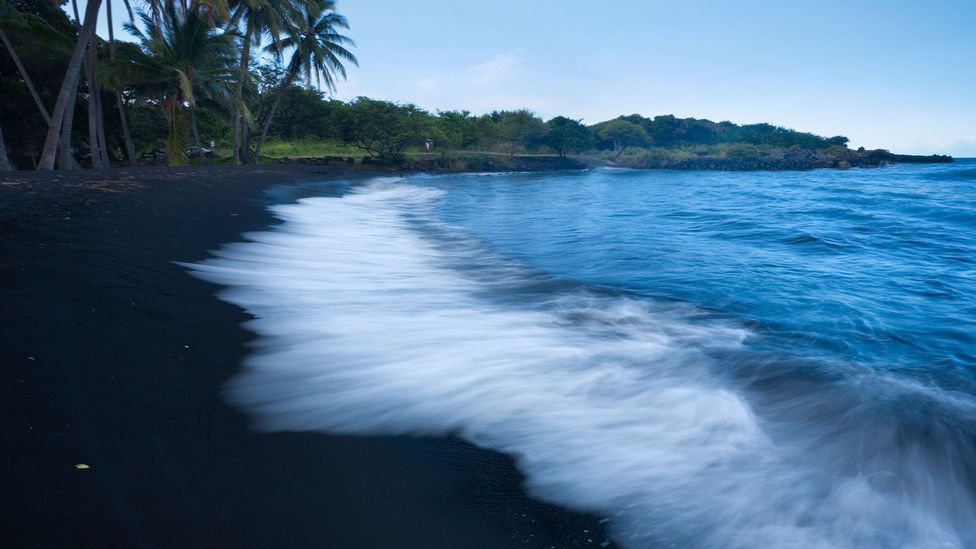
Professor Poremba was drawn to the tinkling-glass sounds of waves on a volcanic beach (Credit: James Osmond/Alamy)
In 1996, Japan’s Ministry of Environment famously carried out a nationwide project called 100 Soundscapes of Japan: Preserving Our Heritage. The initiative highlighted unique natural and manmade soundscapes that represent “the richness and wide variety of Japanese nature and culture”, ranging from drifting ice in the Sea of Okhotsk to flapping cranes in a sanctuary in Tsurui to the handweaving of ancient ramie textiles in Fukushima. The goal was to encourage Japanese citizens to set out and experience these sounds for themselves. In 2020, Lapland, Finland, launched a soundscape campaign featuring similarly unique sounds to the region, including a creaky wooden sleigh being driven by huskies, whittling wood in a forest and the clopping of reindeer. And organisations like Quiet Parks International (QPI) have recently formed to promote “quiet tourism” around the globe, encouraging travellers to not just see the world, but listen to it, too.
According to environmental scientist Lauren Kuehne, actively trying to absorb the sounds around you while travelling helps you understand a destination in a different way. “We have become very accustomed to treating our ears as these sort of quaint but not necessarily essential appendages,” she said. “I think that once you start to listen, once you actually start to listen, you start to appreciate how much bigger the world is.”
This sentiment was echoed by Samara Kester, a retired emergency medicine physician who now serves on QPI’s board. “A photograph is two dimensions. When you are looking at something you’re seeing [it’s] maybe 180 degrees, maybe 270 degrees. Sound is 360 [degrees]. You hear it all around you.” Kester explained how teaching herself to be a better listener has not only expanded her sense of travel, but helped her relive her travels once she’s back home. “You immerse yourself in that place again. You recreate those memories and therefore recreate the feelings that you had, which are very hard to articulate. You can reexperience that and that will send you to where you were before.”
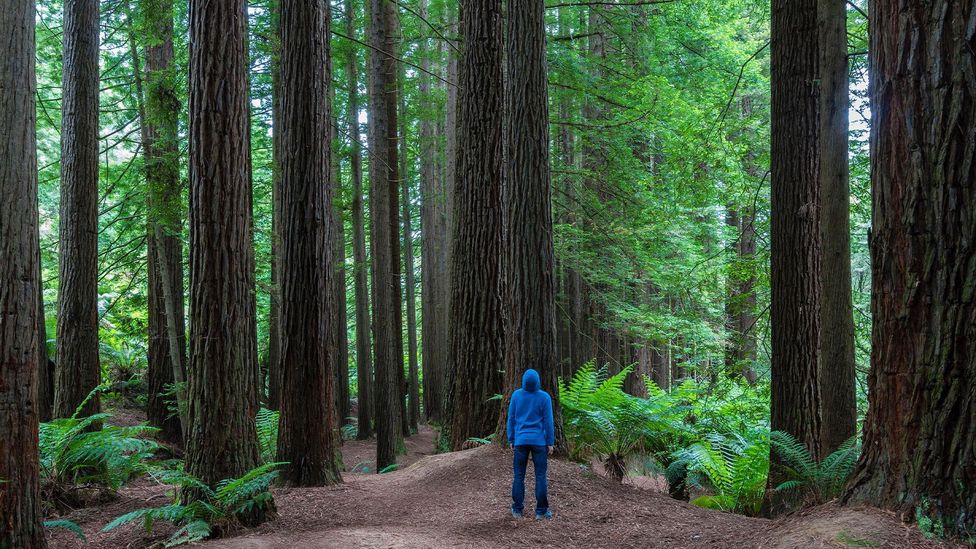
By paying attention to the sounds around us, we can become better listeners and travellers (Credit: Yuen Man Cheung/Alamy)
But how, exactly, does one become a more active, more aware listener?
Gordon Hempton, QPI’s co-founder, said that by paying greater attention to the sounds around us in our everyday lives, we can become better listeners in our travels. “Listen to the place. Listen to where you are. What do you feel? Notice what you feel.” Hempton said that doing such exercises at home and in new environments enhances our “auditory horizon”.
Hempton encourages travellers to go into nature and embrace the differences in our auditory horizon as if we were our nomadic ancestors. “We are as descendants of nomadic hunters and gatherers,” he said. “The Earth is a solar-powered jukebox. No matter where you go – even a short distance on planet Earth, the sounds change spatially around you. Not only that, but they change by the time of day. So, when we take this approach … no matter where you go, [you’ll have] that a-ha moment.”
Months after climbing up out of the dark cavern, on the other side of the world in my Los Angeles home, I find myself popping on my headphones and listening back to the rush of falling water inside the mystical Cave of the Fairies. When I close my eyes, I can feel the spray of water against my skin, the sense of letting my ears lead me on a faraway adventure. Mentally, I’m right back there – if only for a moment.
—
Join more than three million BBC Travel fans by liking us on Facebook, or follow us on Twitter and Instagram.
If you liked this story, sign up for the weekly bbc.com features newsletter called “The Essential List”. A handpicked selection of stories from BBC Future, Culture, Worklife and Travel, delivered to your inbox every Friday.




